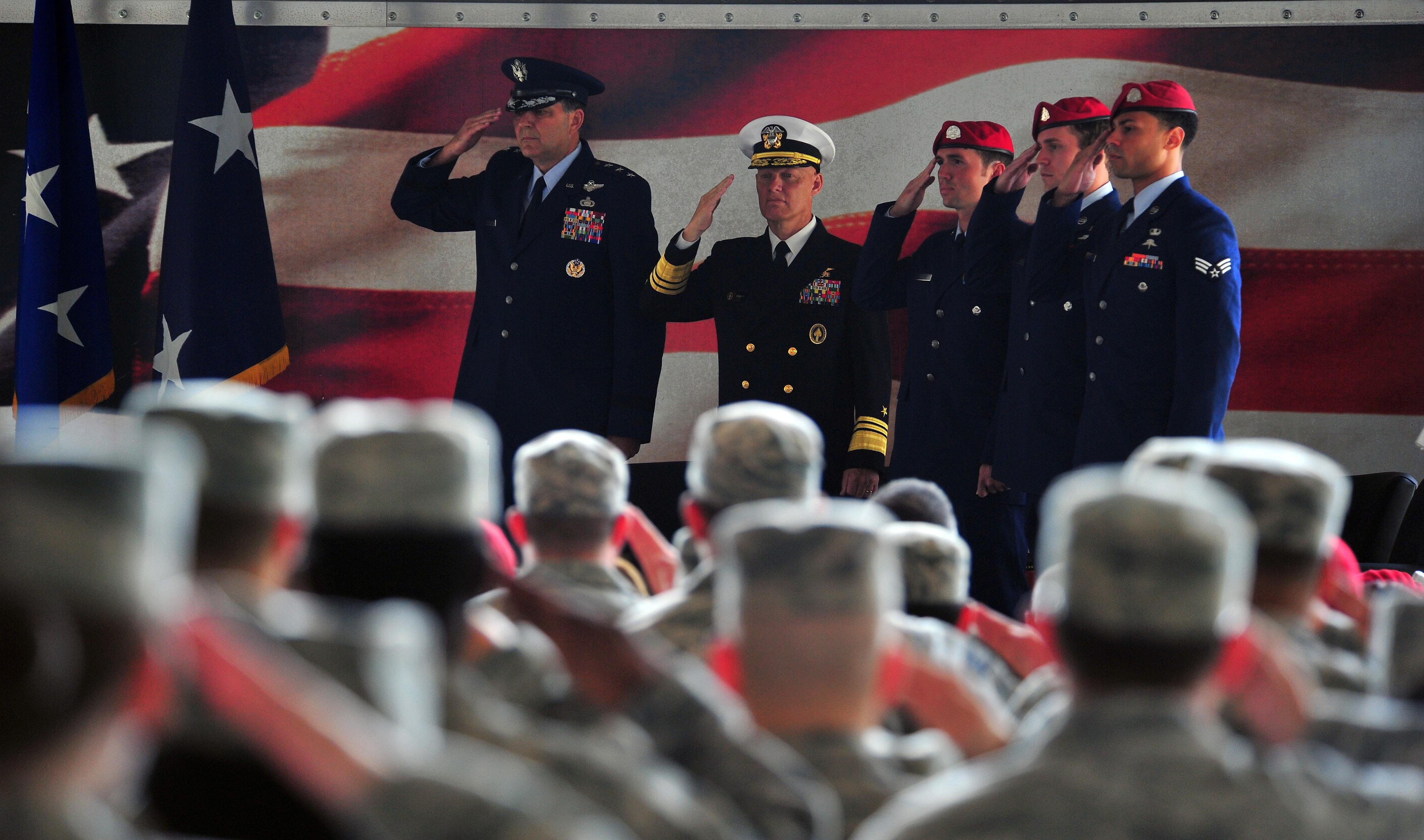Lt. Gen. Bradley Heithold, commander of Air Force Special Operations Command, and Vice Adm. Sean Pybus, deputy commander of US Special Operations Command, stand beside SrA. Dustin Temple, recipient of the Air Force Cross, and TSgt. Matthew Greiner and SrA. Goodie Goodman, both recipients of the Silver Star. Air Force photo by A1C Ryan Conroy.
Tobias Burns and Matthew L. Schehl
May 7, 2015—Fayetteville, N.C.—As SrA. Dustin Temple fired back at the insurgents that had surrounded his unit in a remote area of Helmand Province, Afghanistan, some terrifying chatter came in over enemy radio.
Insurgents were moving in to take American Special Forces troops alive.
So definitive was the Taliban advantage during the battle that raged from Sept. 27-29, 2014, that insurgents on the rooftops didn’t bother to take cover from the gunships, jet fighters, and attack helicopters that fired on them from above.
Nonetheless, Temple, along with TSgt. Matthew Greiner and SrA. Goodie Goodman, coordinated air attacks and ammunition drops from their positions on the ground effective enough to repel the enemy onslaught and win the battle.
The three airmen, all combat controllers assigned to the 21st Special Tactics Squadron here, were honored for their valor Wednesday at a ceremony at Pope Army Air Field, Fort Bragg, in front of their families, commanding officers, and hundreds of airmen and soldiers.
Temple was awarded the Air Force Cross, the second highest honor for valor in combat, behind only the Medal of Honor. He is only the seventh recipient of the Air Force’s highest honor since the attacks of Sept. 11, 2001.
Greiner and Goodman each were given the Silver Star, which is among the military’s most prestigious awards.
“I just feel honor,” Temple said after the ceremony. “When they said I was getting the Cross, I couldn’t believe it. I was just doing my job.”
The combat controllers saved the lives of the soldiers in the Army Special Forces unit to which they were attached, as well as the 24 Afghan commandos fighting with them, according to their medal citations.
The mission was to infiltrate a well-known enemy staging point and disrupt operations. By the time the battle was over, coalition forces had killed more than 60 insurgents, seized 250 pounds of narcotics, and destroyed major stockpiles of weapons and ammunition.
Vice Adm. Sean Pybus, deputy commander of US Special Operations Command, and Air Force Special Operations Command boss Lt. Gen. Bradley Heithold spoke at the ceremony, praising the recipients and thanking their families.
Heithold stirred the crowd by noting the “joy that we all feel from our children’s successes.”
Pybus stressed the “personal relationship” that develops between air controllers, whose primary job is to call in airstrikes, and the troops that rely on them to operate on the ground.
“There are so few of them in number that you become very close to them,” he said.
Army Capt. Evan Lacenski, then commander of ODA 7221 of the 7th Special Forces Group, credited the airmen with the success of their mission over the 48-hour long battle.
“Thirteen members of ODA 7221 owe their lives to you, and will never forget what you did,” Lacenski said during the hour-long awards presentation.
He later drew a laugh from the crowd, telling of the countless emails he wrote to commanding officers extolling the airmen’s conduct.
The battle in Helmand Province, which took place in the Kajaki District, the ?site of a strategically valuable dam, was not without casualties.
Sgt. 1st Class Andrew Weathers died of a gunshot wound to the head from sniper fire.
“It was a crushing blow,” said Goodman during a May 5 conference call. “But that’s when we knew we had to prevail.”
